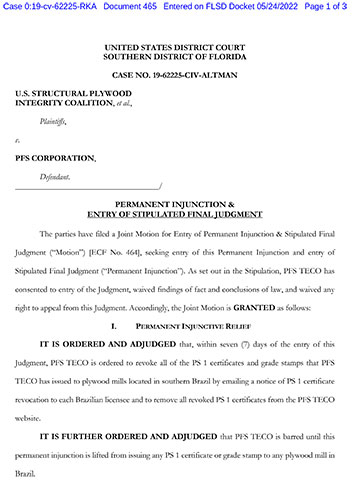Judge’s Injunction Stops Sale of Brazilian Plywood in Plywood Safety Lawsuit
Homes built with off-grade Brazilian plywood face greater risk from future hurricanes
Permanent Injunction issued by Judge Roy Altman
May 26, 2022 07:00 AM Eastern Daylight Time
FORT LAUDERDALE, Fla.–(BUSINESS WIRE)–A lawsuit to stop the importation and sale of substandard structural plywood from Brazil has ended in a permanent injunction barring a long-time certifier from operations in Brazil. The suit alleged false advertising, loss of revenue and negligence related to the structural plywood failing to meet U.S standards and was therefore unsafe. In a Ft. Lauderdale federal court on May 24, Judge Roy Altman entered a permanent injunction requiring the revocation of all PS 1 certificates issued by PFS-TECO to over a dozen Brazilian mills producing structural plywood for the U.S. market. The decision forces wholesalers and retailers to immediately consider these products off-grade and to either obliterate the PS 1 stamp on the plywood before resale or destroy it.
“As a result, everyone currently holding this inventory is now on notice that it should be considered off-grade, which means the PS 1 grade stamp on each panel should be obliterated before resale or the panel destroyed.”
“This case highlights how a few bad actors profited by essentially looking the other way while substandard, and potentially dangerous plywood was imported into the U.S. and used to build homes and businesses,” said Michael Haglund, counsel representing the U.S. Structural Plywood Integrity Coalition, of Haglund Kelley, LLP.
The strong language in Judge Altman’s permanent injunction raises serious questions about what a plywood importer or distributor holding Brazilian plywood inventory bearing a PFS-TECO grade stamp should do with that inventory. “At this stage, a permanent injunction has been issued against a long-time certifier of Brazilian PS 1 plywood due to the clear inadequacy of its quality assurance system in that country,” continued Haglund. “As a result, everyone currently holding this inventory is now on notice that it should be considered off-grade, which means the PS 1 grade stamp on each panel should be obliterated before resale or the panel destroyed.”
The U.S. Structural Plywood Integrity Coalition includes nine family-owned U.S. plywood manufacturers alleging that PFS-TECO falsely certified that plywood imported from Brazil met U.S. structural integrity requirements. The substandard Brazilian plywood has been used in construction throughout the U.S. and during reconstruction efforts following hurricanes along the East Coast, including Florida and Puerto Rico.
“The establishment of a strict standard for the veneer quality in Brazil that must be used to manufacture PS 1 plywood is critical to protecting the U.S. plywood industry from the unfair competition of off-grade Brazilian plywood masquerading as meeting the PS 1 standard,” said Gray Skipper, VP of Scotch Plywood in Fulton, Alabama. “Our mills follow precise recipes in manufacturing plywood to meet the PS 1 standard that are backed up by extensive regionwide testing of the southern yellow pine species we use to make plywood in the South. Brazil has planted these same species that are native to the southern U.S. in a region where pine grows extraordinarily fast and produces veneer that is significantly less dense and therefore less strong than what we use in the U.S.”
The substandard plywood is produced by more than 30 plants in southern Brazil. Companies like PFS-TECO inspect and certify Brazilian plywood to meet the PS 1 structural standard prior to import and sale in the U.S. Building codes require that structural grade plywood panels incorporated into roofs, floors and walls of residential and commercial buildings in the U.S. are PS 1 certified for structural integrity. Although the Brazilian plywood was stamped PS 1 by PFS-TECO, it experienced massive failure rates during testing by the American Plywood Association and other testing laboratories.
In 2021 alone, Brazilian plywood accounted for 11% of all U.S. supply with nearly 1.2 billion square feet sold. While much of that plywood went into new construction throughout the U.S., it was also used to help rebuild homes and buildings in Florida and Puerto Rico following Hurricane Maria due to its cheaper price. Haglund notes that the use of substandard materials in construction is concerning anytime, but especially when considering the possible risks to building integrity during a future hurricane and in light of Miami’s Surfside condominium collapse in 2021.
